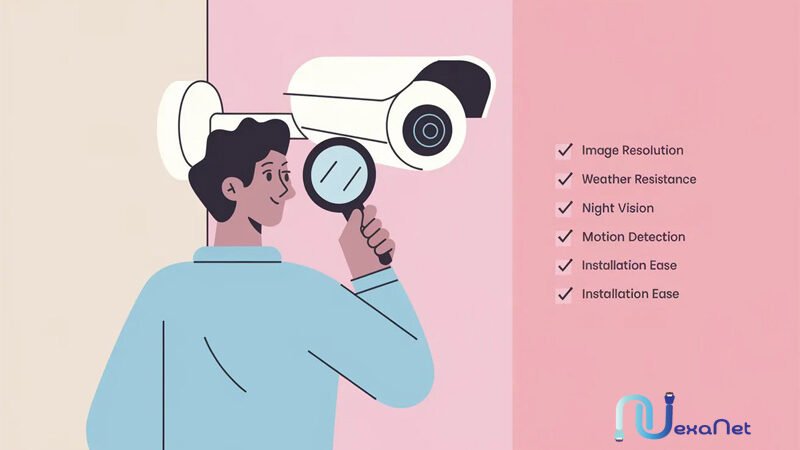How do you choose a good CCTV camera?
Choosing a good CCTV camera involves evaluating your specific needs, understanding the features available, and selecting a camera that balances quality, functionality, and budget. Here’s a step-by-step guide to help you make the right choice:
1. Determine Your Purpose
- Home Security: Focus on ease of use, affordability, and basic features like motion detection and night vision.
- Business Security: Prioritize high-resolution cameras, advanced analytics, and scalability.
- Public Spaces: Look for durable, weatherproof cameras with wide coverage and advanced monitoring capabilities.
2. Key Features to Consider
a. Resolution
- Standard Definition (SD): 480p – Basic monitoring, low cost.
- High Definition (HD): 720p or 1080p – Good for most home and small business needs.
- Full HD/4K: 2MP to 8MP – Ideal for capturing fine details like faces or license plates.
Tip: Higher resolution requires more storage and bandwidth.
b. Field of View (FOV)
- Narrow FOV: Covers a smaller area but provides more detail.
- Wide FOV: Covers a larger area but may distort edges.
- Pan-Tilt-Zoom (PTZ): Allows remote control to adjust the camera’s view.
Tip: Choose a camera with a FOV that matches the area you want to monitor.
c. Night Vision
- Infrared (IR) Night Vision: Provides black-and-white footage in low light.
- Color Night Vision: Uses ambient light or built-in LEDs for color footage at night.
- Starlight Technology: Captures clear images in extremely low light.
Tip: Ensure the camera has a sufficient IR range (e.g., 30-100 feet) for your needs.
d. Storage Options
- Local Storage: SD cards, DVR/NVR systems.
- Cloud Storage: Requires a subscription but offers remote access and backup.
- Hybrid: Combines local and cloud storage for redundancy.
Tip: Consider how much footage you need to store and for how long.
e. Connectivity
- Wired (PoE): Reliable and powered through a single Ethernet cable.
- Wireless (Wi-Fi): Easy to install but may be affected by signal interference.
- Battery-Powered: Ideal for temporary or remote installations.
Tip: Wired cameras are more reliable for long-term use.
f. Smart Features
- Motion Detection: Alerts you when movement is detected.
- Facial Recognition: Identifies known individuals.
- Two-Way Audio: Allows communication through the camera.
- AI Analytics: Detects unusual behavior, such as loitering or object removal.
Tip: Choose features that align with your security needs.
g. Weather Resistance
- Indoor Cameras: Not weatherproof; for use inside only.
- Outdoor Cameras: Look for an IP66 or IP67 rating for dust and water resistance.
Tip: Ensure outdoor cameras can withstand extreme temperatures if needed.
3. Set a Budget
- Budget Cameras: 50−50−100 – Basic features, suitable for small homes.
- Mid-Range Cameras: 100−100−300 – Better resolution and additional features.
- High-End Cameras: $300+ – Advanced features like 4K resolution, AI analytics, and professional-grade durability.
Tip: Balance cost with the features you need.
4. Research Reputable Brands
- Premium Brands: Hikvision, Dahua, Axis Communications, Hanwha Techwin.
- Mid-Range Brands: Reolink, Amcrest, Lorex, Swann.
- Budget Brands: Wyze, Blink, Yi Technology.
Tip: Choose a brand with good customer support and warranty options.
5. Read Reviews and Compare
- Check customer reviews on platforms like Amazon, Best Buy, or security forums.
- Look for feedback on reliability, ease of installation, and video quality.
6. Consider Compatibility
- Ensure the camera works with your existing security system or smart home ecosystem (e.g., Alexa, Google Assistant).
- Check if the brand offers a dedicated app for remote monitoring.
7. Test Before Committing
- If possible, test a single camera before purchasing a full system to ensure it meets your expectations.
8. Legal Considerations
- Check local laws regarding CCTV installation, especially for audio recording and privacy concerns.
Recommended Cameras Based on Use Case
- Home Security: Reolink Argus 3 Pro, Wyze Cam v3, Blink Outdoor.
- Small Business: Hikvision ColorVu, Dahua Starlight, Amcrest UltraHD.
- Large-Scale/Commercial: Axis Communications Q35, Hanwha Techwin XNV-6081.
Summary Checklist
- Define your purpose and coverage area.
- Choose the right resolution and FOV.
- Ensure night vision and weather resistance.
- Decide on storage and connectivity options.
- Evaluate smart features and compatibility.
- Set a budget and research reputable brands.
- Read reviews and test before committing.
By following these steps, you can choose a CCTV camera that meets your security needs and provides reliable performance.
2 responses to “How do you choose a good CCTV camera?”
-
Hi there colleagues, its wonderful piece of writing on the topic
of educationand fully defined, keep it up all the time.-
Thank you so much for your kind words!
I’m really glad you found the piece on education informative and well-defined. Your encouragement means a lot — we’ll definitely keep striving to share valuable content!
-




Leave a Reply to Get More Info Cancel reply